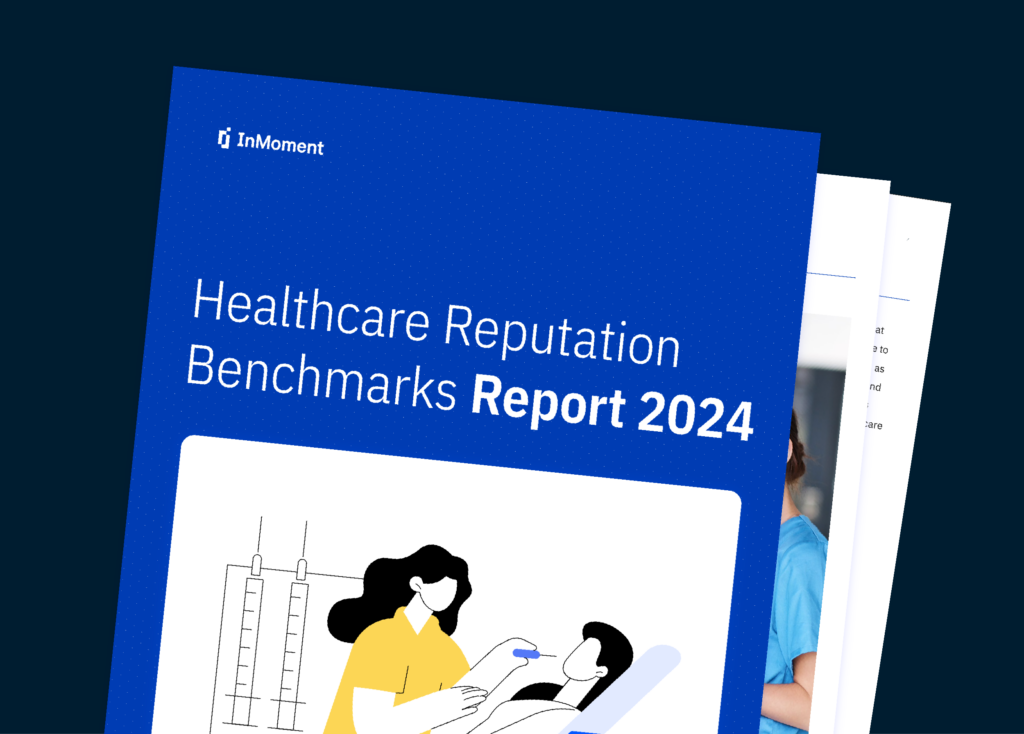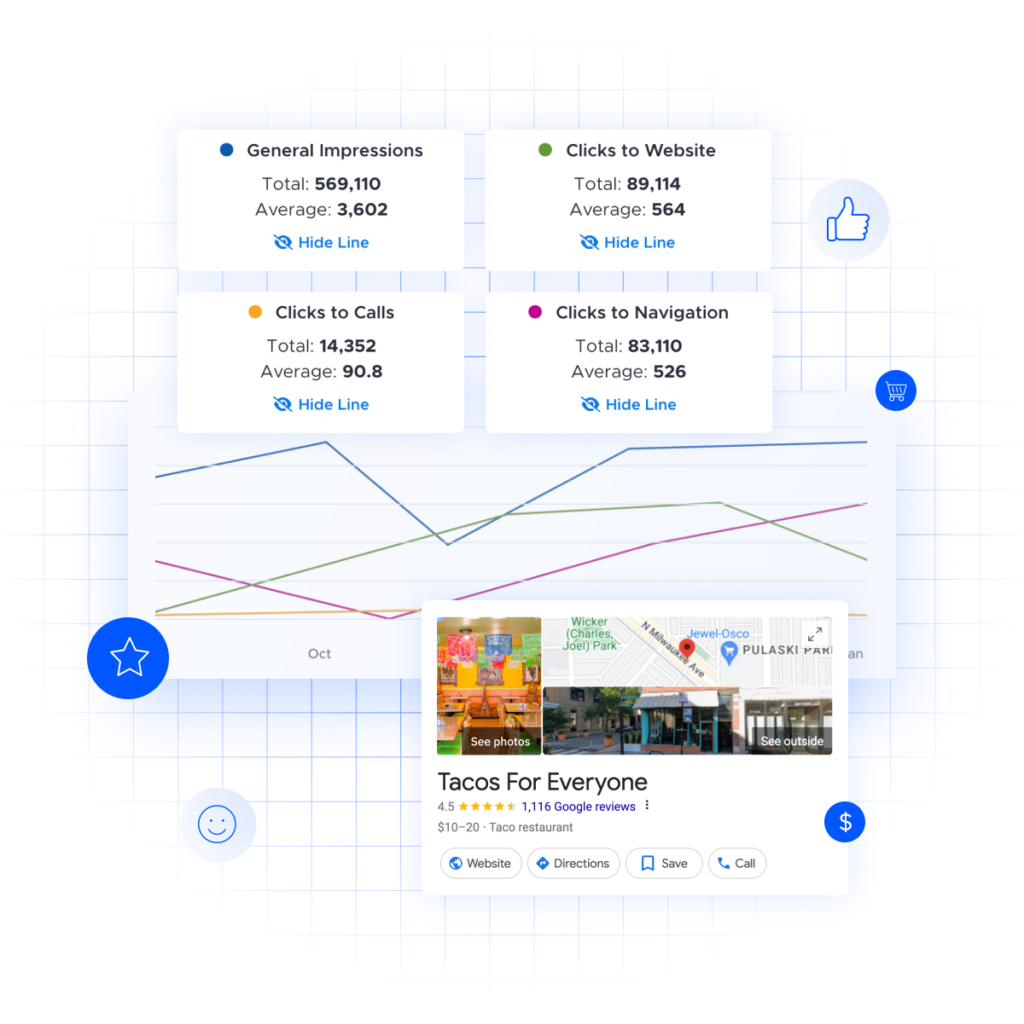Healthcare Reputation Management: The Complete Guide
Healthcare reputation management is important for building a trustworthy organization with loyal, lifelong patients.
In the healthcare industry, your reputation is built on trust and credibility. And, in a time where opinions are formed in an instant and shared in a second, online reputation management has never been more important for healthcare organizations.
What is Healthcare Reputation Management?
Healthcare reputation management refers to the strategic process of monitoring, influencing, and maintaining the perceptions and opinions about a healthcare provider or organization within its target audience. This involves actively managing how patients, staff, partners, and the wider community perceive a healthcare organization’s quality of care, professionalism, and trustworthiness.
Why Reputation Management for Healthcare is Important
Healthcare is inherently built on trust. Patients rely on healthcare providers to deliver competent, compassionate, and reliable care. A positive reputation instills confidence in patients and encourages them to seek care from a particular provider or organization.
Furthermore, a strong reputation can contribute to higher levels of patient satisfaction and retention. Patients are more likely to return to a healthcare provider they trust and recommend their services to others.
A positive brand reputation not only attracts patients but also top talent. Healthcare professionals want to work for organizations with strong reputations for providing high-quality care and treating staff well. Reputation management can help healthcare organizations attract and retain skilled and motivated staff members.
Benefits of Healthcare Reputation Management
Effective reputation management in healthcare organizations can produce benefits that go beyond customer experience metrics, they can directly correlate to patient care improvement. Reputation management can result in more loyal patients, a happier and more effective staff, and instituion improvement.
Benefit #1: More Loyal Patients
Reputation management for healthcare organizations produces more loyal patients by improving the patient experience. The patient experience refers to every touch point the patient has with your organization, from appointment scheduling to follow-up communications.
By enacting reputation management strategies, you will gain access to valuable insights into the patient experience that allow you to identify areas for improvement. Two common strategies are asking for, and responding to, patient reviews. By encouraging patients to share their experiences, your organization can gain valuable perspectives that would have otherwise been missed. Furthermore, responding to reviews demonstrates a commitment to your patients and shows them that your organization cares about their feedback.
You can take your reputation management strategy further by utilizing a reputation management platform to centralize your patient reviews in one convenient location. This approach allows you to analyze the feedback as a whole to identify trends, patterns, and areas for improvement. With this information, you can make informed decisions and implement targeted improvements to improve the patient experience.
Benefit #2: More Effective Staff
Reviews from your patients do more than tell you about how they feel about their experience, they can also help you identify areas of improvement within your organization. Patient reviews provide direct and candid assessments of the various aspects of care and service provided by your organization. By analyzing the content of these reviews, you can gain a deeper understanding of what aspects of the patient experience are resonating positively and which ones may be falling short of expectations. For example, patients may highlight issues such as long wait times or communication barriers.
Having this data gives you the tools you need to make a case for organizational improvements that will make a difference. Whether it is additional headcount or employee training, reputation management can point you in the right direction of what changes need to be made to improve your organization.
Benefit #3: Institution Improvement
Reputation management for healthcare organizations will positively impact your organization. This will happen as a result of increased patient retention. Almost half of healthcare organizations report that they lose more than 10% of their revenue due to a lack of patient retention. If you actively engage in reputation management, you will not only be saving lost revenue but you will gain revenue that you would otherwise have missed.
Satisfied patients are also more than likely to share their experiences. Starting patient referral programs can be a great way to encourage satisfied patients to share their experiences and also drive patient acquisition.
How to Improve Your Healthcare Reputation Management
When it comes to reputation management, it can be easy to be overwhelmed by all the different things you are told to do. While different organizations may find success with a variety of different tactics, there are a few key strategies that every healthcare organization looking to improve their reputation management should prioritize.
Claim Your Institution Listings
To create a foundation for your reputation management strategy, you need to own the places your healthcare organization is listed. This means you need to find and claim your local listings and make sure all of the relevant information is up to date.
If your healthcare organization has more than one location, it’s crucial to ensure consistency across all listings. This involves maintaining accurate and uniform information, such as addresses, phone numbers, operational hours, and services offered, across each location’s respective listings.
Additionally, implementing a centralized local listing management solution for managing multiple listings can streamline the process and ensure that changes or updates are promptly reflected across all platforms. Consistent and up-to-date listings not only improve visibility and accessibility for patients seeking your services but also contribute to local SEO performance and a cohesive and professional brand image for your organization across all locations.

Generate and Respond to Reviews
Generating and responding to reviews is a fundamental aspect of healthcare reputation management. Positive reviews can enhance your organization’s credibility and attract new patients, while negative reviews provide valuable feedback for improvement and an opportunity to demonstrate responsiveness and professionalism.
You should actively encourage patients to leave reviews by integrating review requests into your patient communication strategy. This can include sending follow-up emails or text messages after appointments, including review links on your website and social media profiles, and displaying signage in your clinic inviting patients to share their experiences.
Furthermore, you need to monitor review platforms regularly and respond promptly to both positive and negative reviews. It is important to understand how to respond to Google reviews and express gratitude to patients who leave positive feedback and acknowledge their contributions to your organization. For negative reviews, respond empathetically and professionally, offering solutions or a willingness to address any concerns raised. Prompt responses demonstrate that you value patient feedback and are committed to providing exceptional care.
Create Location Pages
If your hospital network has multiple locations, then it would be beneficial to your institution and your patients to create a page dedicated to each location within your network. Since all hospitals within the same network don’t always offer the same services, outlining the specific services at a location on their respective location page would improve the patient experience.
For example, a patient looking to schedule an MRI will go online looking for hospitals near them with this equipment. If a hospital’s location page outlines what services they offer, it saves the patient time by knowing which location to go to, rather than calling around to different locations.
Create Educational Resources
Educational resources play a vital role in healthcare reputation management by empowering patients with valuable information, building trust, and establishing your organization as a reliable source of healthcare knowledge.
Start by identifying the information needs and concerns of your patient population. Conduct surveys, analyze patient feedback, and engage with frontline staff to gain insights into common questions, misconceptions, and areas where patients seek more information.
Using that knowledge, you can create informative and engaging content that addresses patient questions, educates about health conditions and treatments, and promotes wellness and preventive care. Content formats can vary from articles, blog posts, infographics, videos, and podcasts, all the way to downloadable guides. Ensure that content is accurate, evidence-based, and easy to understand for patients of varying health literacy levels.
Create Profile Pages for Practitioners
Another way to improve your healthcare reputation management is to create profile pages for practitioners at specific locations, or in your network. Not only do you want reviews for your location, but also for various staff providing the care such as doctors, surgeons, therapists, and any other specialists you may have.
This step creates a direct link between your staff and your patients. While instilling trust in the facility is important, it is also important to instill trust the staff that will be caring for your patients.
Manage Review Sites for Your Practitioners
Once practitioners begin receiving reviews about their care plans and treatment, it should be treated as if the reviews are about any institution or location in your healthcare network. You should be responding to these reviews, taking note of the feedback provided, and closing the loop with any patients who had negative experiences.
Ask for Patient Feedback
Just as any other business would ask for reviews from their customers, it is important to ask for reviews from your patients. You want to give the patients an avenue to provide feedback on the facilities, as well as they care they received. Be sure to offer anonymous feedback options to secure medical confidentiality.
This feedback does not have to be limited to patients, but can extend to loved ones as well. Healthcare experiences are unique in the sense that they rarely involve just one person. There is usually a support system of some kind surrounding patients in their healthcare experiences, and it is important to get their feedback on what they experienced.
What to Look for in Healthcare Reputation Management Software
When choosing a reputation management platform for your organization, there will be different features and plans to evaluate. You will most likely be able to find success with a variety of solutions. However, in every successful reputation management platform, there are a few key features that are must-haves to ensure success.
Local Listing Management
Ensure that the software offers robust local listing management capabilities. This feature allows you to manage your organization’s presence across various online platforms and directories, such as Google My Business, Yelp, and Healthgrades. Centralized management of local listings ensures consistency of information and enhances visibility to potential patients searching for healthcare services in your area.
Review Request Automation
Look for software that streamlines the process of requesting and collecting patient reviews. Automated review request functionality allows you to systematically solicit feedback from patients following their appointments or interactions with your organization. By automating this process, you can increase the volume of reviews received and gather valuable insights into the patient experience more efficiently.
Sentiment Analysis
Sentiment analysis is another important feature to consider when evaluating a healthcare reputation management software because it allows organizations to gain a deeper understanding of what patients are feeling.
Sentiment analysis utilizes natural language processing algorithms to analyze the tone, emotion, and context of patient reviews. By understanding the sentiment behind each review, your organization can better identify strengths and weaknesses in the patient experience.
EMR Integration
Integration with electronic medical records (EMR) systems is crucial for seamless data exchange and comprehensive patient insights. Look for reputation management software that offers integration with popular EMR platforms, allowing you to sync patient demographic information, appointment history, and clinical data. EMR integration enhances the depth of patient insights available for analysis and ensures that review requests are targeted and personalized.

REPORT
2024 Healthcare Online Reputation Benchmarks Report
Pearl-Plaza’s 2024 Healthcare Online Reputation Benchmarks Report provides a top-level view of the state of reviews today for the healthcare industry — and how these reviews reflect the experiences patients want to have. The benchmarks serve as a valuable tool for organizations looking to assess their reputational performance, set goals, make informed decisions, and drive continuous customer experience improvement.
Improve Your Healthcare Reputation with Pearl-Plaza
Pearl-Plaza’s reputation management platform gives you the ability to house all your patient feedback in one place, optimize local listings, and utilize sentiment analysis to get to the root of how your patients are feeling. Our customizable reports also help you directly correlate reputation management to patient care success. Ready to see for yourself? Watch a reputation management demo today!
References
Etatics. 45+ Patient Retention and Churn Rate Statistics. (https://etactics.com/blog/patient-retention-statistics). Accessed 4/9/2024.





